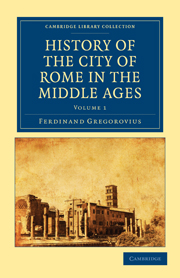Book contents
- Frontmatter
- TRANSLATOR'S PREFACE
- PREFACE TO THE SECOND EDITION
- Contents
- BIOGRAPHICAL NOTICE OF FERDINAND GREGOROVIUS
- BOOK I FROM THE BEGINNING OF THE FIFTH CENTURY TO THE FALL OF THE WESTERN EMPIRE IN 476
- BOOK II FROM THE BEGINNING OF THE REIGN OF ODOACER TO THE ESTABLISHMENT OF THE EXARCHATE IN RAVENNA, 568
- CHAPTER I
- CHAPTER II
- CHAPTER III
- CHAPTER IV
- CHAPTER V
- CHAPTER VI
- CHAPTER VII
- INDEX
CHAPTER I
Published online by Cambridge University Press: 05 July 2011
- Frontmatter
- TRANSLATOR'S PREFACE
- PREFACE TO THE SECOND EDITION
- Contents
- BIOGRAPHICAL NOTICE OF FERDINAND GREGOROVIUS
- BOOK I FROM THE BEGINNING OF THE FIFTH CENTURY TO THE FALL OF THE WESTERN EMPIRE IN 476
- BOOK II FROM THE BEGINNING OF THE REIGN OF ODOACER TO THE ESTABLISHMENT OF THE EXARCHATE IN RAVENNA, 568
- CHAPTER I
- CHAPTER II
- CHAPTER III
- CHAPTER IV
- CHAPTER V
- CHAPTER VI
- CHAPTER VII
- INDEX
Summary
REIGN OF ODOACER—SIMPLICIUS POPE (468—483)—BUILDING OF NEW CHURCHES—S. STEFANO ROTONDO—S. BIBIANA—ODOACER COMMANDS THE ELECTION OF FELIX III.—THEODORIC ENTERS ITALY WITH THE OSTROGOTHS—OVERTHROW OF ODOACER'S RULE—THEODORIC BECOMES KING OF ITALY, 491
Rule of Odoacer
Incapable of rising to any new political conception, the ignorant but powerful and benevolent Odoacer took into his keeping the ruins of the Empire, upon which he settled his warlike followers. Supported by these followers, but depending for counsel on Latins, he governed Italy from Ravenna according to traditionary usage. The forms of government remained unaltered; the Emperor it is true was absent, but a shadow of the Senate still survived. The barbarian king allowed Roman affairs to be administered as heretofore through the Prefects. From the year 480 onwards, he probably even appointed the accustomed Consuls for the West, and the Consuls, on their entrance into office, gave the people the customary gifts of money and games in the Circus. The Curia of hereditary Senators still enjoyed a traditional respect as Council of the Empire and representative of Rome, as the assembly of the ancient patricians, and boasted amid its ranks Basilius, Symmachus and Boethius, Faustus, Venantius, Severinus, Probinus, and other consular names. We possess no information, however, either as regards the number or the constitution of this corporation.
- Type
- Chapter
- Information
- History of the City of Rome in the Middle Ages , pp. 257 - 286Publisher: Cambridge University PressPrint publication year: 2010First published in: 1900

